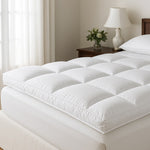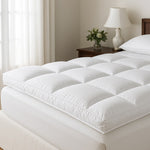You have no items in your shopping cart.

Not getting enough sleep increases your sensitivity to pain. A recent study conducted by researchers at Harvard Medical School is the latest study that confirms the direct relationship between a lack of sleep and an increased sensation of pain.
The results suggest that you can experience better pain relief simply by getting more sleep. For those who can’t extend their sleeping schedule, taking substances that promote wakefulness during the day, such as caffeine, can also help.
The study was published in Nature Medicine in May 2017. The researchers first took baseline measurements. They measured the length of regular sleep cycles, tracked brain-wave patterns using electroencephalography (EEG) and electromyography (EMG), and recorded sensitivity to different sensations.
Then the researchers studied pain sensitivity during periods of sleep-deprivation. People often stay up too late because they’re busy watching TV or surfing the Internet, so the researchers used entertainment to induce sleep deprivation.
The researchers kept track of the brain’s EEG patterns so that they’d know when sleep was about to set in. When that occurred, they provided more stimulating activities to prevent sleep.
They kept one group awake for 12-hour stretches and measured stress-hormone levels to make sure stress levels stayed low. At various times throughout the days, they tested for pain sensitivity.
The pain tests didn’t involve barbaric methods like electric shocks, however. The researchers would apply heat, cold, pressure, or the component of chili peppers called capsaicin. They tested reactions to non-painful stimuli, too, like loud noises.
The results of this experiment showed that five consecutive days of sleep deprivation caused significantly more sensitivity to pain. They excluded other factors, like being over-excited or stressed, to make sure the result was simply due to the sleep deprivation.
The researchers went deeper with their study, however. Since sleep-deprivation caused more sensitivity to pain, the researchers decided to test how effective the pain-killers ibuprofen and morphine were. They also tested to see whether substances that promote alertness had any effect on their pain sensitivity. For the latter part of the experiment, the researchers administered either caffeine or the drug modafinil as a stimulant.
Surprisingly, ibuprofen did not decrease the elevated pain sensitivity. Even the stronger pain-killer, morphine, lost most of its effectiveness to lower pain sensitivity during periods of sleep deprivation. That indicates that people who rely on pain-killers might not get the intended effect very well if they don’t get enough sleep. They will probably have to take higher doses to feel relief.
When stimulants like caffeine and modafinil were administered, though, the heightened pain sensitivity did decrease. Staying alert and awake during the day has a positive effect on the sensation of pain.
The results indicate that increasing the number of sleeping hours can reduce pain sensitivity, and this can especially help those who have chronic pain. Often, pain causes lack of sleep, which then causes more pain, and so on. It’s a self-perpetuating cycle.
However, if you get a good night’s sleep regularly and possibly take caffeine during the day to stay awake and alert, pain sensations may diminish, making it easier to sleep again the next night.
Other studies have produced similar results. A 2001 French study tested how sleep deprivation affected pain thresholds in healthy male adults aged 26–43 years old. The pain thresholds were measured using pressure and temperature. Results showed the pain threshold decreased an average of 8% after a night of total sleep deprivation. However, when the men slept to recover, their pain threshold went up 15%.
Another study conducted in 2009 tested pain sensitivities on patients who had temporomandibular joint disorder (TMD), a painful facial disorder. The researchers used pressure and temperature to induce pain on both the jaw and forearm, and then they measured pain sensitivities with and without sleep deprivation. Again, the results showed a significant increase in pain sensitivity for both thermal and mechanical pain stimuli when the person was sleep-deprived.
Getting plenty of sleep and feeling well-rested isn’t just good for your body and soul. It can also increase your pain threshold and decrease your pain sensitivity. Having plenty of sleep can make pain-killers more effective, as well. This is one pain-management technique that is completely within your control and without side effects. So, try to get at least 8 hours of sleep every night.
Better health starts with better sleep. Ready to find out if a luxury pillow from the Queen Anne Pillow Company can change the way you sleep? Have a look around our website, and if you have questions, reach out via our contact us page and we’ll get right back to you!
Photo by freestocks.org on Unsplash

Not getting enough sleep increases your sensitivity to pain. A recent study conducted by researchers at Harvard Medical School is the latest study that confirms the direct relationship between a lack of sleep and an increased sensation of pain.
The results suggest that you can experience better pain relief simply by getting more sleep. For those who can’t extend their sleeping schedule, taking substances that promote wakefulness during the day, such as caffeine, can also help.
The study was published in Nature Medicine in May 2017. The researchers first took baseline measurements. They measured the length of regular sleep cycles, tracked brain-wave patterns using electroencephalography (EEG) and electromyography (EMG), and recorded sensitivity to different sensations.
Then the researchers studied pain sensitivity during periods of sleep-deprivation. People often stay up too late because they’re busy watching TV or surfing the Internet, so the researchers used entertainment to induce sleep deprivation.
The researchers kept track of the brain’s EEG patterns so that they’d know when sleep was about to set in. When that occurred, they provided more stimulating activities to prevent sleep.
They kept one group awake for 12-hour stretches and measured stress-hormone levels to make sure stress levels stayed low. At various times throughout the days, they tested for pain sensitivity.
The pain tests didn’t involve barbaric methods like electric shocks, however. The researchers would apply heat, cold, pressure, or the component of chili peppers called capsaicin. They tested reactions to non-painful stimuli, too, like loud noises.
The results of this experiment showed that five consecutive days of sleep deprivation caused significantly more sensitivity to pain. They excluded other factors, like being over-excited or stressed, to make sure the result was simply due to the sleep deprivation.
The researchers went deeper with their study, however. Since sleep-deprivation caused more sensitivity to pain, the researchers decided to test how effective the pain-killers ibuprofen and morphine were. They also tested to see whether substances that promote alertness had any effect on their pain sensitivity. For the latter part of the experiment, the researchers administered either caffeine or the drug modafinil as a stimulant.
Surprisingly, ibuprofen did not decrease the elevated pain sensitivity. Even the stronger pain-killer, morphine, lost most of its effectiveness to lower pain sensitivity during periods of sleep deprivation. That indicates that people who rely on pain-killers might not get the intended effect very well if they don’t get enough sleep. They will probably have to take higher doses to feel relief.
When stimulants like caffeine and modafinil were administered, though, the heightened pain sensitivity did decrease. Staying alert and awake during the day has a positive effect on the sensation of pain.
The results indicate that increasing the number of sleeping hours can reduce pain sensitivity, and this can especially help those who have chronic pain. Often, pain causes lack of sleep, which then causes more pain, and so on. It’s a self-perpetuating cycle.
However, if you get a good night’s sleep regularly and possibly take caffeine during the day to stay awake and alert, pain sensations may diminish, making it easier to sleep again the next night.
Other studies have produced similar results. A 2001 French study tested how sleep deprivation affected pain thresholds in healthy male adults aged 26–43 years old. The pain thresholds were measured using pressure and temperature. Results showed the pain threshold decreased an average of 8% after a night of total sleep deprivation. However, when the men slept to recover, their pain threshold went up 15%.
Another study conducted in 2009 tested pain sensitivities on patients who had temporomandibular joint disorder (TMD), a painful facial disorder. The researchers used pressure and temperature to induce pain on both the jaw and forearm, and then they measured pain sensitivities with and without sleep deprivation. Again, the results showed a significant increase in pain sensitivity for both thermal and mechanical pain stimuli when the person was sleep-deprived.
Getting plenty of sleep and feeling well-rested isn’t just good for your body and soul. It can also increase your pain threshold and decrease your pain sensitivity. Having plenty of sleep can make pain-killers more effective, as well. This is one pain-management technique that is completely within your control and without side effects. So, try to get at least 8 hours of sleep every night.
Better health starts with better sleep. Ready to find out if a luxury pillow from the Queen Anne Pillow Company can change the way you sleep? Have a look around our website, and if you have questions, reach out via our contact us page and we’ll get right back to you!
Photo by freestocks.org on Unsplash








